
|
History of Sex in Cinema: 1996, Part 2 |


|
Kama Sutra: A Tale of Love (1996, India/UK) Indian director Mira Nair's lush romantic melodrama about love and betrayal was set in pre-colonial, 16th century India. Because of the film's sexual content and frequent nudity, it was threatened with an NC-17 rating and therefore released un-rated in the US. While being filmed in India (where it was ultimately banned), its release title was changed to "Maya & Tara" and its controversial content was kept secret. It told of two girlhood friends who as adults became competitive rivals for power and love in a love triangle:
Maya succeeded in arousing the lustful affections of the powerful, playboyish Prince Raj Singh (Naveen Andrews) on the eve of Tara's wedding day to the Prince and was then banished and exiled from the palace by her mother for being a whore. She also inflamed the jealousy of Tara when the Prince called out Maya's name during the sexual consummation of their vows. Soon afterwards, Maya was trained in love-making by Rasa Devi (Rekha) through the Indian book of love (the Kama Sutra). She also fell in love with long-haired stone sculptor Jai Kumar (Ramon Tikaram) for whom she posed as a nude model for his life-sized statues, one of which was recognized as her likeness by King Raj (the former Prince). Maya was chosen to become part of the King's harem as his most favored courtesan. In one lesbian-tinged sexual scene after Tara was repeatedly rejected by the promiscuous Raj with many mistresses, Maya taught her how to be a better lover by kissing down the length of her body.
Jai, Maya's real love, was ultimately killed by the debauched, drug-addicted rival King after they fought in a near-naked wrestling contest, and the sculptor was sentenced to prison and death (by a stomping from an elephant). |
 Tara (Sarita Choudhury) 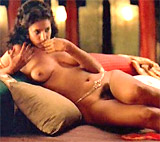 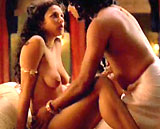 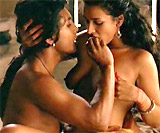 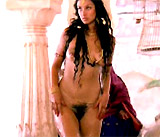 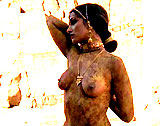 Maya (Indira Varma) |
||||||||||||||||||

|
Kingpin (1996) In this Farrelly Brothers ribald, gross-out comedy, down-and-out, middle-aged ex-bowling star Roy Munson (Woody Harrelson) was so broke that he was forced to have sex with his landlady (Lin Shaye) to pay the rent. After the scene of sex (implied) with her, he was seen kneeling and puking into the toilet, and the decrepit old woman was smoking in bed and telling him:
She made the sign of cunnilingus - her spread fingers in a V shape with her tongue wagging in between. |
 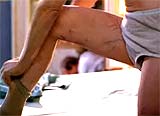 Landlady in Bed - Pulling Up Her Socks |
||||||||||||||||||

|
Co-writer/director Lynne Stopkewich's debut film was a controversial and provocative limited-release independent film about the taboo subject of necrophilia. It was originally rated NC-17, but two minutes were cut to make it R-rated for commercial video release. The non-exploitative film had one of the few depicted instances of actual necrophilia in a film, and was advertised with the clever tagline:
It starred Molly Parker as the sympathetically-portrayed Sandra Larson - an assistant at the Wallis Funeral Home, where she engaged in embalming and exercised her obsession with finding spiritual calm and erotic attraction to the dead by kissing a corpse in a coffin ("I've always been fascinated by death. The feel of it, the smell of it, the quietness of it"). The film opened with her voice-over:
In the film's most talked-about scene about 45 minutes into the film, she had sex with the corpse of an accident victim under harsh and glaring flourescent lighting in the embalming room. In her panties and bra, she first twirled around and circled the table holding the corpse. After stripping her clothes off, she then moved onto the end of the metal table, climbed on, and straddled the pallid body. The intensity of her sexual feelings glowed a bright white before the scene ended.
By the film's grim ending, her romantically-obsessed student boyfriend Matt (Peter Outerbridge) learned of her love of death, so he decided to commit suicide by hanging himself naked (with her present, in his room filled with lit candles) in order to be with her forever. When she professed to love him, he replied: "No, you don't Sandra, but you will" before kicking over the stool and ending his life. When she was alone with Matt's corpse at the funeral home, she thought to herself:
|
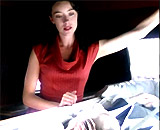 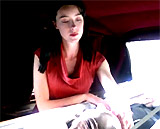 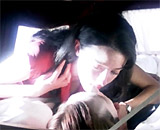 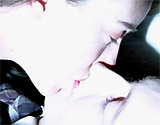 Sandra Larson (Molly Parker) 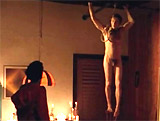 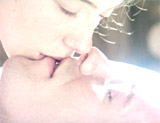 Sandra with Matt (Peter Outerbridge) |
||||||||||||||||||
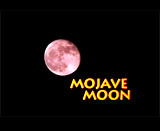
|
Mojave Moon (1996) Director Kevin Dowling's quirky and offbeat romantic thriller and road-movie was taglined:
A young Angelina Jolie starred as free-spirited, shapely, and sexy Eleanor 'Ellie' Rigby (named after the Beatles' song). The plot was similar to Jonathan Demme's film Something Wild (1986). This was one of Jolie's early trio of films before she became famous, that also included Hackers (1995) and Foxfire (1996) - featuring nudity that kept her noticed. Al McCord (Danny Aiello), a middle-aged divorced car salesman (originally from NY), was in Johnie's, a Los Angeles restaurant with two of his buddies in a booth: Sal Santori (Alfred Molina) and Terry (Zach Norman). When busty Ellie (with a short white tennis skirt and a blue T-shirt with a revolver printed on it, and emerald-colored nail polish) made a dramatic entrance, the men commented: "Borderline jailbait. Worth the risk, possibly." The camera slowly panned up her slinky legs as she ordered a turkey sandwich. She smiled and pointed at Al, who was trying to ignore her and was hiding behind a menu. When alerted to her attention, Al joined her at her table, after asking: "Do I know you?...Should I sit down?" As they became acquainted and he paid for her meal, she expressed interest in seeing his place. She suddenly and unexpectedly kissed him as they waited for the elevator up to his apartment, and when they entered, she immediately said: "I like this place," plopped herself on his bed, and flirtatiously kissed him. All of her attention was a come-on - she claimed she had a problem and had to get to her car before the night was over, in the Mojave Desert area where her mother Julie (Anne Archer) lived in a trailer ("moveable home"). She convinced Al to take her on a road trip (he assured her: "Your problem's solved, I have a brand new car, and I love to drive"). Along the way, Al began to fall for Ellie, but didn't realize that she had taken him to the desert to set him up with her mother Julie. Once they arrived, Al became intimidated by Julie's violent, jealous, menacing, often-drunk, psychotic and possessive live-in boyfriend Boyd (Michael Biehn), a biker who worked the graveyard shift as a tow-truck driver - and lit his cigarettes with a blow-torch. Meanwhile, Ellie departed for a while to meet up at the Buffalo Chip Saloon with her long-haired boyfriend Kaiser (Jack Noseworthy) and impulsively elope. (Later, when Boyd left for work, he stopped off at the Saloon - presumably met up with Kaiser, beat him up, and then briefly returned home to stuff Kaiser's body in Al's trunk.) At the same time, silky-voiced, ditzy but pretty Julie seduced Al with homemade pie a la mode, daiquiris, and a rooftop dance and view of the Mojave Moon, when his car wouldn't start (due to "wig wags" in the environment). He hesitated, but then accepted her alluring invitation to sleep under the full moon for part of the night. When Al drove away later that evening to return to LA, he had a flat tire in the desert, and when he opened his trunk, he found the body of Kaiser in his car trunk. A number of unusual circumstances then occurred - a suspicious highway patrolman that pulled up, and an attempted robbery and shoot-out at a gas station while having the tire repaired. The next morning when he finally got back to his apartment, Ellie arrived (uninvited) at his front door, and once inside told him the news: "I'm not marrying Kaiser...Kaiser is a jerk, and I'd rather be right here with you....I couldn't stop thinking about you all night." She started undressing down to her mismatched bra and black underwear, and announced: "It's hot. I'm gonna really fast use your shower, OK?" When he asked her to stop stripping, she queried: "Why, am I ugly?" In the shower, she called for Al to get her some shampoo ("I don't want to wash my hair with soap"), and he walked in on her, noticing her showing off her nudity in the shower (reflected in the cabinet mirror).
Flustered, the doorbell rang - Julie had also arrived, to return his lost wallet that he had accidentally dropped at her place, with his address. Wrapped in a towel, Ellie was very surprised to see her mother. Al told the two of them that there was a body ("he looked dead") in his trunk, and then he frantically realized that his car had been stolen from the garage. When Ellie identified Kaiser as the corpse from Al's description, she feared that Boyd had killed him, and stashed the body in Al's car to make it look like he did it. None of them knew that the not-so-dead, but bruised Kaiser had regained consciousness and wandered off when the car was being stripped by the thieves in Los Feliz. When the threesome noticed Boyd outside of Al's apartment, they fled in Julie's car to a nearby motel where they rented a room. While Al was searching for his stolen car with Julie's car, Boyd located the women and was able to convince them to return to Mojave with him (crying: "I can't live without you. Please don't ever leave me again"). Once they got back to Mojave, Boyd went off his rocker and locked the two in a storage shed. With his pal Sal, Al returned to Mojave to rescue the two women, but they failed when Boyd knocked them unconscious. Boyd's idea was to dump the four of them (Sal, Al, Julie, and Ellie) off a cliff in Julie's car. Ultimately, his crazed plan to release the car from his tow-truck over a cliff went awry. His backup plan was to use his tow-truck to ram the teetering car on the edge of the cliff. As he laughed maniacally, Al tried to seize the steering wheel, causing Boyd to miss his target. The truck careened off the cliff and Boyd died in an explosive crash. In the conclusion, Ellie wanted to return to LA (without marrying Kaiser), while Al decided to remain for awhile with Julie at her "moveable home" (trailer) ("I'd like to take a better look at that moon" - Al told Julie). |
 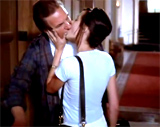 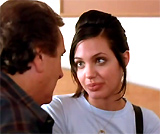 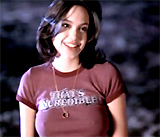 'Ellie' Ripley (Angelina Jolie) 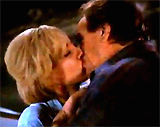 Julie (Anne Archer) and Al 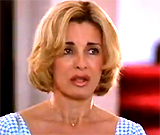 Julie 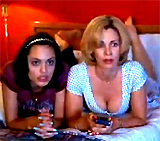 Ellie and Julie |
||||||||||||||||||

|
Norma Jean & Marilyn (1996) Director Tim Fywell's innovative biopic feature film, a made-for-TV film for HBO, displayed two conflicting sides of the split schizophrenic personality of a young, love-seeking, tragic star - ultimately named Marilyn Monroe. The blonde bombshell was portrayed by two cast members:
In a voice-over in the opening dream sequence, Norma Jean imagined herself naturally naked in church as she walked up the center aisle and knelt to receive communion:
And then immediately in the next scene poolside, she stripped off her bathing suit to swim naked, to the amazement of her boyfriend Eddie Jordan (Josh Charles), who soon dove in to join her. She thought to herself: "God, I want this feeling to last forever."
The film included a recreation of the famous nude Playboy calendar shoot of Norma against a red backdrop, and Marilyn - accompanied by Jane Russell (Erika Nann) - imprinted their famed breasts and hand prints in wet cement at Grauman's Chinese Theatre. In some scenes, Judd appeared as Marilyn's alter-ego by her side, especially as the star deteriorated due to drug addiction dependency. In one later sequence, Marilyn (Mira Sorvino) flashed her breasts by a swimming pool to Eddie, trying to recreate the sexual spark between them:
Although the film contained various inaccuracies, such as overdoing Marilyn's later psychopathic behavior, and the manner of her death, it was praised for its provocative sequences in which Norma Jean and Marilyn appeared together. |
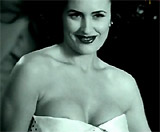 Jane Russell (Erika Nann)  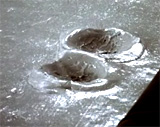  Marilyn and Jane Russell at Grauman's Theatre |
||||||||||||||||||
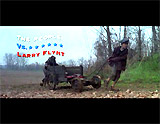
|
The People Vs. Larry Flynt (1996) Director Milos Forman's critically-acclaimed and provocative docudrama/biopic told the story of trashy adult Hustler magazine publisher/editor Larry Flynt (Best Actor-nominated Woody Harrelson) and his series of confrontations with the authorities over anti-pornography laws and his claim of First Amendment rights. During its initial release, an attack upon the film by feminist pioneer Gloria Steinem coincidentally led to plummeting box-office, and Columbia's $35 million film took in only $20 million. She criticized the film for making Flynt look like an heroic free speech advocate, while ignoring that he had published images of sexual torture and mutilation on a regular basis. In the film, a docudrama, love story, and courtroom drama all in one, Flynt was portrayed in his early adulthood as a womanizer and strip-club manager in Cincinnati, Ohio. He began to publish a newsletter (the future Hustler magazine) to market his club's nude strippers. The magazine took off when it published 'peeping-tom' photos of a nude Jackie Onassis and sold 2 million copies. He became romantically involved with (and later married) one of his dancer/strippers:
Althea was seen performing an awkward strip routine. She boldly told Flynt: "You are not the only person who has slept with every woman in this club." Later, she was part of a threesome lesbian scene and a hot-tub scene (which Flynt joined) where she proposed marriage - she assured him that they could still sleep with other people. During one scene of a photo-shoot, the photographer and Flynt argued over whether to show the woman's vagina. During a powerful speech before a gigantic backdrop of images of sex and violence/murder, Flynt argued with anti-pornography activists. He asked why photographing sex and nudity was criminally pornographic, but violence and murder was not. Flynt displayed pictures of sex intercut with famous Pulitzer Prize-winning photos of extreme violence, racism, war and the Holocaust.
He offered his thoughts on free speech after his 1988 court victory and vindication by the Supreme Court:
After an assassination attack that left him paralyzed, the film's ending portrayed AIDS-stricken Althea dying from a drug overdose and/or drowning in a bathtub with a heartbroken Flynt embracing her. In the concluding frames, Flynt watched old videotapes on multiple monitors of his deceased Althea.
|
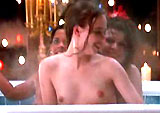 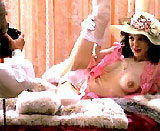 Althea (Courtney Love)  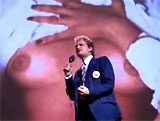  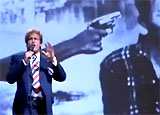 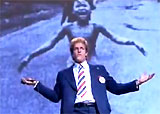 Larry Flynt's Speech |
||||||||||||||||||

|
The Pillow Book (1996, UK, Fr/Nether.) Peter Greenaway's NC-17 rated erotic drama about sex, death and revenge was noted for full-frontal male nudity and erotic scenes of the two lovers. It told of a young Japanese-born girl named Nagiko Kiohara (Vivian Wu as an adult) whose Kyoto writer/calligrapher father (Ken Ogata) gave her a special ritualized birthday gift every year -- a face-painted poem, while her aunt (Hideko Yoshida) read "beautiful things" from Sei Shonagon's classic 10th century Japanese book of love called The Pillow Book. [Nagiko was named after the famous 10th century keeper of a Pillow Book or diary.] On her fifth birthday, Nagiko witnessed a life-changing sexual transaction - her financially-stretched father was forced to have sex with his exploitative, homosexual publisher "Yaji-san" (Yoshi Oida) in exchange for getting his work published. When she reached maturity at age 18 and the ritual ended, Nagiko realized she was still fixated on having expressive verses inscribed on her naked body (calligraphy on skin) as a prelude for sex and erotic attraction from lovers who were expert calligraphers. She was forced into an unhappy, arranged marriage with her publisher's nephew (Ken Mitsuishi), who was unwilling to paint her body as she desired. He even jealously burned her pillow book, writings, and their house when the obsessively-dissatisfied Nagiko went on a sexual-spiritual search for a calligrapher who could seduce and satisfy her by painting calligraphy symbols on her body.
As a fashion model who had fled from Japan to Hong Kong, she met British expatriate and bisexual English translator Jerome (Ewan McGregor), and he allowed her to write her manuscript on his skin (a reversal of the normal pattern). One of the film's most expressive images was one of the lovers bathing in a tub together. Fatefully and fortunately, his lover was also her publisher, who had rejected her book. To seek revenge against the publisher for his sexual humiliation of her father and to get her book published, she sent various men - beginning with Jerome - (with their skin bearing her "books") to the publisher, to strip and present her texts. But then Jerome betrayed her trust by making love to the publisher, setting up the film's tragic conclusion. Jerome asked for forgiveness, but Nagiko refused. Depressed, he took pills and accidentally overdosed. Eventually, the skin of Jerome's body was made into a pillow book, and she bore Jerome's child (Hikari Abe), who carried on the tradition of face-painting. |
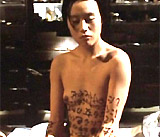  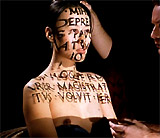  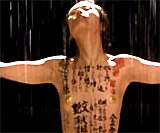 Nagiko (Vivian Wu) |
||||||||||||||||||
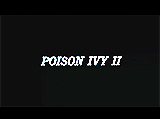
|
Poison Ivy II (1996) (aka Poison Ivy II: Lily) Another erotic thriller, a direct-to-video release by director Anne Goursaud, this was the first sequel in a long series of direct-to-video 'Poison Ivy' films (see other entries):
It had an entirely new cast and production crew, and was released both in an R-rated and unrated version. 20-something Alyssa Milano was making her second major erotic feature film, following Embrace of the Vampire (1995), also by director Goursaud - it was another attempt by the actress to cast off her child-star image. In this one, Milano took the role of innocent Lily Leonetti, a California art student away from her sheltered home life in Michigan. She soon became obsessed by a box of nude self-portrait pictures (and diary) of a fearless, sexually-confident teenaged temptress named Ivy. She decided to become someone else (she described herself later: "Someone tough and infallible. Beautiful, sexy. Fearless. And it worked"). As she transformed herself into Lily by dressing more provocatively, cutting her hair, piercing her belly button, etc., she became more sexually desirable ("incredibly sexy") and passionate with her fellow student boyfriend, an amorous frosted blonde sculptor named Gredin (Johnathon Schaech). As they sat on a blue-sheeted bed together, he removed her black bra and felt her breasts from behind before they undressed further and made love. They also had sex against a shower glass door. She also agreed to pose nude for married art teacher Donald Falk (Xander Berkeley), the father of Daphna (Camilla Belle) (the young girl that she babysat), and it was inevitable that Falk became sexually obsessed and madly jealous over her. After being stalked and nearly killed during a sexual assault by Donald (who fell to his death), Lily reconciled with Gredin after he saved her, and they expressed their love for each other. |
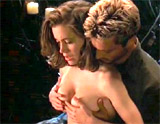 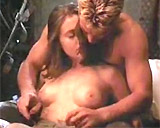 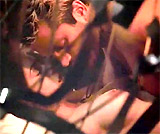 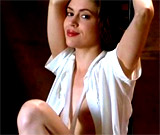 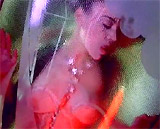 Lily (Alyssa Milano) |
||||||||||||||||||

|
Stealing Beauty (1996, It./UK/Fr.) Bernardo Bertolucci's R-rated film was a sex-drenched character study with gorgeous cinematography and visually-stunning settings (in Tuscany, Italy). The arty, soft-focus film also featured hedonistic lifestyles, sex, free-spirited nudity (including full frontal male and female nudity), drug usage, and some bad language. The film's director often objectified the seductively innocent actress Liv Tyler (daughter of Aerosmith's Steven Tyler) in shooting her beautiful sexuality and rebelliousness as an erotic fantasy of his own. 19 year old American Lucy Harmon (Liv Tyler) was on vacation visiting family friends in Italy (mostly aging intellectuals), grieving after the suicide of her poet mother Sara Harmon. She stayed with some nomadic, British expatriate artist friends of her late mother (including Donal McCann as Irish sculptor Ian Grayson, Sinead Cusack as his wife Diana Grayson, and Jeremy Irons as invalid English playwright Alex Parrish). Rachel Weisz also had a bit part as topless sunbather Miranda Fox - Diana's daughter from a previous marriage. Lucy had two main goals for her summer visit:
[By film's end, Lucy had discovered that Ian Grayson was probably her real father.] At one point in the film, Lucy allowed herself to pose for Diana's husband Ian, with one breast exposed for her sketched portrait. 'Virginal' Lucy's "beauty" was stolen as the idealized young female was eventually deflowered.
She rejected a former love named Niccolo Donati (Roberto Zibetti), whom she had kissed on her previous trip four years earlier. However, she found lyrical love and true romance with Niccolo's brother Osvaldo (Ignazio Oliva) in a very gentle, non-explicit erotic scene before the glow of a nearby campfire, although the male kept his pants on during intercourse. He revealed that it was his first time too, and that he was the one who had pretended to be Niccolo and had written her a love letter that she had particularly cherished. |
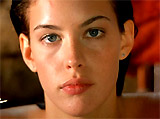 Lucy Harmon (Liv Tyler) 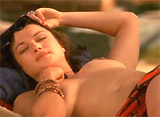 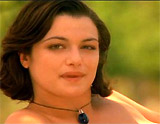 Miranda (Rachel Weisz)   Lucy's Sexual Deflowering Sequence |
||||||||||||||||||

|
Striptease (1996) Writer/director Andrew Bergman's R-rated feature film was one of the least unsexy of all films - on top of being one of the most criticized films ever. It won the Razzie "Worst Picture" Award for 1996, even defeating Pamela Anderson's entry Barb Wire (1996) - Demi Moore also won "Worst Actress" for the year and Bergman won "Worst Director" and "Worst Screenplay." "Worst Screen Couple" was awarded to Burt Reynolds and Demi Moore. The video release of the film contained an additional two minutes of footage that was not in the theatrical version. Moore was paid a record-breaking actress salary of $12.5 million for her stripper role in the picture - a role which she thoroughly researched at various strip clubs in preparation. It wasn't unusual for Moore to strip - she had done so on five previous occasions on film:
The detested film told about the stripper profession and Florida political corruption involving star Burt Reynolds as sex-crazed Congressman David Dilbeck. Surgically-enhanced and in-shape Demi Moore starred as Florida mother Erin Grant, a former FBI secretary, 'reluctantly' earning $15,000 in six weeks as an Eager Beaver Club dancer-topless stripper in Miami, to raise funds for an appeal to win back her 7 year-old daughter Angela (real-life daughter Rumer Willis) lost in a custody battle with her negligent, ex-con husband Darrell (Robert Patrick). In one scene while standing on top of his coffee table, she stripped out of her black bra (down to her black thong) as the perverted, obsessed Congressman Dilbeck promised her - grabbing at her ankles and knees:
After she asked: "How much?", he told her about his twisted desire for her "fresh hot lint" obtained from her laundromat - confessing "I'm afraid I made love to it." She laughed incredulously: "Close your eyes. I've got a little surprise for you. Keep 'em closed. No peeking" - and smashed the spike of her high heel into his hand. |
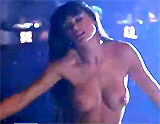   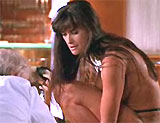 Stripper Erin Grant (Demi Moore) |
||||||||||||||||||
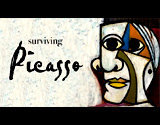
|
Surviving Picasso (1996) Director James Ivory's biographical romantic drama (with his usual collaborative team of producer Ismail Merchant and screenwriter Ruth Prawer Jhabvala) was about the 20th century's revolutionary artist - Spanish painter and sculptor Pablo Picasso (Anthony Hopkins). The film was based upon socialite Arianna Huffington's best-selling 1988 biography: Picasso: Creator and Destroyer. It chronicled Picasso's intense friendship and rivalry with Henri Matisse (Joss Ackland), and one of his many sexist, libido-enriched seductions and abuses of women. The film's main focus was on his tyrannical and possessive control over 23 year-old Parisian art student Francoise Gilot (Natascha McElhone) (who narrated the film in voice-over), beginning in 1943 (when Picasso was in his 60s), after which she became his emotionally-terrorized mistress. Picasso was known to follow a particular routine when he introduced himself as a painter to female prospects. In a restaurant, one of Picasso's rival artists and one of his ousted lovers, Argentinian painter Dora Maar (Julianne Moore), looked on as Picasso arrived, and predicted what he would say to two pretty young painters he had just met: "He's going through his usual routine. 'Oh, so you're painters. I'm a painter, too. Come to my studio, I'd like to show you my work. I know your face so well. I painted it before you were even born.'" At her table, Françoise and her visiting student friend Genevieve (Allegra di Carpegna) were approached by the narcissistic and egotistical Picasso - it was the start of her victimization:
Soon after, Francoise made a brief trip to Picasso's studio with Genevieve. As they were leaving, Picasso invited the naive Francoise to return by herself: "Come and see me. But come because you like me, not as if you're visiting the holy shrine of Fatima, all right?" Francoise described her slight reluctance to see Picasso on her own, and waited a few weeks before returning:
She arrived drenching wet from the rain, and Picasso volunteered to dry her hair with a towel. He then told her, self-mockingly, after kissing her: "If you don't even push me away, I might get the idea I could do anything at all with you. If you were a properly brought-up young lady, you would feel insulted. Here I am, an artist of some reputation, and you're an innocent young girl come to visit, and what do I do? I take advantage of you. I insult you." Francoise insisted that she wasn't insulted, or feeling seduced by him. A master manipulator and chauvinist, he knew that soon enough, she would succumb and have sex with him. She defiantly told her father (Bob Peck) that she was quitting school to be with Picasso, so that she would paint full-time: "I've made up my mind. I'm going to study painting full time....I'm responsible for myself....I'm not going on to law school, but I shall try and be a painter!" Her abusive father threatened to throw her out or have her committed, and even viciously slapped her: "I'll teach you to say no to me! No one says no to me!...From now on, you beg for your bread in the streets." Soon after her confrontation with her brash father, and during another visit to Picasso's apartment for an engraving lesson, she was invited to live in his upper attic and paint all day when he suggested that she could be his "secret captive." She responded positively: "I'd like to be alone and paint all day. I wouldn't mind losing my liberty for that." After she entered behind him into his bedroom studio, and while he was turned away removing clutter from the top of his bed, she quietly disrobed behind him. When he turned and saw her total nakedness, he was taken aback by her shapely form:
He walked over to her and caressed her face.
Afterwards in a prophetic scene, Francoise spoke with her wise but resistant grandmother (Joan Plowright) who knew of Picasso's reputation: "He's had 100 lives already. And the whole world knows how many women he's destroyed. I couldn't bear it for you, darling." Francoise replied: "Do you really think I'd let myself be destroyed by a man, even if he is Picasso?" The grandmother added: "Uh, it's going against nature. You are so young. And he's old. It's as if you've taken a wrong turning." But she was insistent and able to convince her grandmother to allow her to live with Picasso: "No. For the first time, I feel that everything is right, that I'm turned in the right direction. I'm sure. I'm so sure. I've never been so sure of anything in my whole life." It was the start of a 10-year period of mistreatment of Francoise.
|
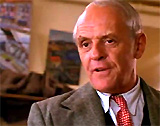 Pablo Picasso (Anthony Hopkins) 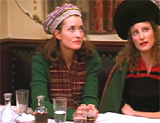 Francoise (Natascha McElhone) with Dora (Julianne Moore) 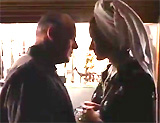 Francoise's Visit to Picasso's Studio - Alone 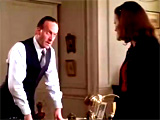 Francoise's Confrontation With Her Father 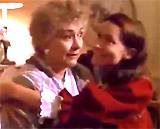 Francoise with Her Wise Grandmother |
||||||||||||||||||

|
2 Days in the Valley (1996) This intricately-told episodic, Southern California crime caper melodrama by director John Herzfeld (his directorial debut film) was inspired by Quentin Tarantino's Pulp Fiction (1994) and noted for its sexy scenes of gorgeous, statuesque blonde sexpot and hitman's girlfriend Helga Svelgen (future Oscar-winner Charlize Theron in her feature film debut). In a memorable bedroom scene after a shower with wet hair, the Norwegian model appeared from the bathroom wearing lacy lingerie (a white teddy and see-through silk robe). Sociopathic, black glasses-wearing boyfriend Lee Woods (James Spader) asked her to stop and pose for him: "I just want to look at you. (He laughed) God definitely broke the mold after you, baby." With her long legs, she strutted over to the bed where she sat down on a chair and adopted a Basic Instinct style, open-legged pose to further entice him. He remarked: "Not too tall. It's a world that's too short" as he crawled over and kissed her kneecap and inner left thigh while she arched her back. He jumped up: "God, you are beautiful!" he exclaimed. After placing an ice cube in his mouth, he tossed her back onto the bed, and grabbed her throat - although she cautioned: "Don't put your hand around my throat...It makes me not trust you." He told her: "You can trust me, you can always trust me," then ripped open her gauzy top, and cooled her left nipple with the ice cube held between his teeth. She turned him over and reciprocated by ripping open his blue shirt while she sat astride him. She completely removed her top as he grabbed her breasts and they voraciously kissed. He added: "I guess I must really be in love with you."
The film was also memorable for Helga's catfight in a 2nd floor motel room with co-star Teri Hatcher (as ex-Olympic skier Becky Foxx) after they argued and Helga called her a "bitch." Helga was shot in the right side, while Becky fled to the street and was killed when hit by a car (off-screen). Earlier in the film, Helga was pictured topless and dead in a faked photo to fool Roy Foxx (Peter Horton) into believing that she had been murdered. |
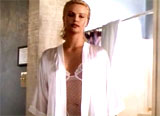 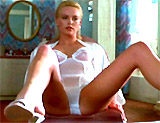 Helga (Charlize Theron)  Death of Helga in Faked Photo 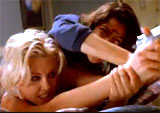
Catfight: Helga vs. Becky (Teri Hatcher) |
||||||||||||||||||
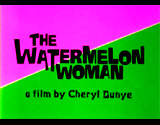
|
The Watermelon Woman (1996) Writer/director/actress Cheryl Dunye's drama (a mockumentary and her first feature film) was the first American feature directed by an African-American lesbian. There were two main characters in the semi-autobiographical, slightly self-indulgent film (a film within a film):
Cheryl was researching and making a documentary film about a long-forgotten black actress (known as "the watermelon woman") in Philadelphia from the 1930s, who appeared in a film titled Plantation Memories (a fictional film, actually) as a plantation Mammy. Eventually, Cheryl learned more about the actress' background - a mirror of the history of the experience of black performers in Hollywood:
One of the key scenes became infamously controversial - an interracial lesbian lovemaking scene between Cheryl and Diana. As they were watching a video about Fae, Diana came onto Cheryl:
They ended up having sex together. Afterwards, Cheryl admitted: "Diana just threw me for a loop. I mean, she's not my type, but I liked it. I don't know what to say next. Maybe it all has to do with this film project which is finally coming together. Hollywood, the Watermelon Woman, Fae Richards, and Diana." |
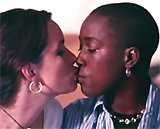 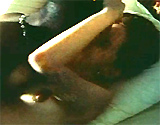 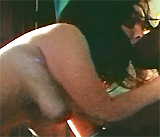 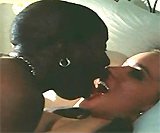
|
||||||||||||||||||